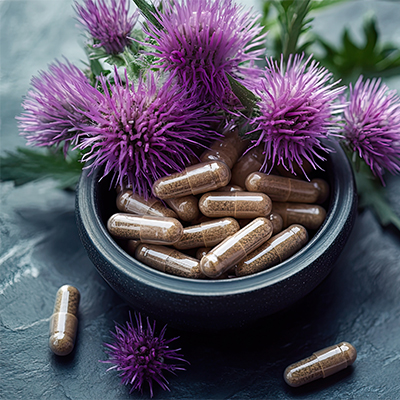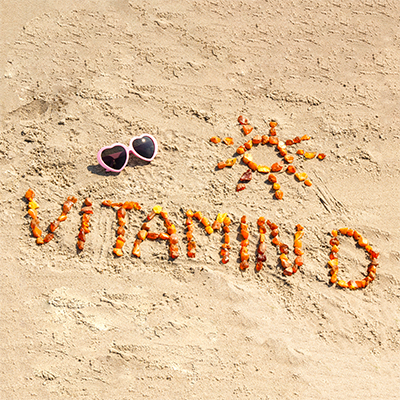Micronutrients
All information about "Micronutrients" and the related magazine articles can be found here.
Our articles are written clearly and link to scientific studies where relevant. This is how we meet our own standards: we regularly deliver new, high-quality content for you—free of charge, no sign-up required, with the highest possible benefit to you.

Zinc & Selenium: Your support for men's health
The silent helpers for vitality and a strong immune system
Discover how zinc and selenium strengthen your health from within as essential building blocks. This guide shows you how to sustainably support your performance and resilience.

Harvest time for your immune system
Zinc & beta-glucan - for gentle strength when summer becomes quieter
When the sun gets lower and the air smells of change, a quiet transition also begins in the body. Zinc and beta-glucan can provide beneficial stimuli right now - for an immune system that experiences the transition consciously and in balance.

Berry power through the summer - with antioxidants & vitamin C
Local berries provide flavonoids, vitamin C and antioxidants - good for the heart, immune system and freshness.
Summertime is berry season - perfect for an active, healthy lifestyle. Local berries such as blackcurrants and blueberries are not only delicious, but also rich in vitamin C and flavonoids. They support cell protection, strengthen the blood vessels and boost your vitality.

Thanks to bitter substances and enzymes, a naturally spring-fit and healthy digestion
Find out how bitter substances and enzymes stimulate your digestion, alleviate digestive problems and gently balance the gastrointestinal tract.
Bitters and enzymes naturally support digestion, relieve bloating and promote general well-being. Discover how you can get off to a fresh and stomach-friendly start with bitter foods, the right diet and high-quality food supplements. For a good gut feeling, day after day.

Springtime is liver time! How milk thistle & choline take the strain off your liver
Find out how choline, milk thistle and a conscious diet regenerate your liver and support your metabolism in a natural way.
After months of heavy eating, your liver also needs a break. Choline and milk thistle promote natural detoxification, strengthen the fat metabolism and provide fresh energy for body and mind. Discover how you can make your liver fit for spring with targeted nutrition and vital substances. Scientifically sound and naturally effective.

Support for Picky Eaters
When children's picky eating behavior endangers the nutrient supply
Does your child consistently refuse vegetables and only accepts a handful of foods? Here you can find out what is behind the so-called “picky eater syndrome”, why vitamin C is so essential for children's development and which tricks help to defuse picky eating behavior without pressure.

Protection for your mucous membranes with vitamin B3 (niacin)
Cold air outside, dry heating air inside - this can put a strain on mucous membranes
Find out how micronutrients such as niacin (vitamin B3) can help to support the natural barrier function of the mucous membranes and effectively counteract dryness. An adequate supply of vitamin B3 can help to maintain the well-being of your skin and mucous membranes during the cold season.

Strengthen your family with a vitamin boost in winter
Little sunlight, fluctuating temperatures and waves of colds challenge the immune system. Find out how you can get through the cold season healthy and full of energy with vitamin C!
Find out which symptoms indicate a vitamin C deficiency, which foods are real vitamin C bombs and how you can easily integrate your daily intake into your everyday life. Whether for parents, children or older people - with the right nutrients, the whole family can stay strong!

Micronutrients: small building blocks – big impact on your health
Find out how essential micronutrients can support your body and why they are indispensable, especially in times of stress and an unbalanced diet.
In today's hectic world, a balanced diet and vital substances often take a back seat. However, micronutrients – such as vitamins, minerals and trace elements – are essential for your health. Find out how these little helpers have a big impact and why they are indispensable in your everyday life.

Why is methylsulfonylmethane (MSM) so important to us?
An adequate supply of sulphur is essential for the proper functioning of enzymes and amino acids. Here you can read about the benefits of MSM for our skin and hair, as well as for osteoarthritis, allergies and sports injuries.

Zinc deficiency: important facts for your health
Discover the effects of zinc deficiency on your health and how to recognise and treat it. Find out why zinc is an essential trace element for your body and mind, and how to maintain optimal zinc levels. Improve your health with this comprehensive information on zinc deficiency!

Tribulus Terrestris is often promoted for muscle building and libido.
When it comes to muscle building and sexual health, many people prefer Tribulus Terrestris to synthetic products. But what about the real effects of the natural supplement?

Often in short supply in winter - Vitamin D
Vitamin D is a real all-rounder when it comes to health: it ensures healthy bones and is involved in many processes in the human body.
Micronutrients – small helpers with a big impact
In today's fast-paced world, where stress and an unbalanced diet are often the order of the day, the topic of micronutrients is becoming increasingly important. But what exactly does this term mean, and why are these tiny helpers so important for our health? Here you will learn how micronutrients support our body.
What are micronutrients?
Micronutrients such as choline are essential substances that the human body needs in relatively small amounts. Unlike macronutrients such as carbohydrates, fats and proteins, they do not provide energy, but they are essential for numerous metabolic processes. Micronutrients primarily include vitamins, minerals and trace elements. However, phytochemicals, omega-3 fatty acids and certain amino acids are also often included in this group.
Important micronutrients are:
- Vitamins (A, B vitamins, C, D, E, K)
- Minerals and vitamins (e.g. calcium, magnesium)
- Trace elements (e.g. iron, zinc, selenium)
- Phytonutrients
- Omega-3 fatty acids
- Proteinogenic amino acids
What is the significance of micronutrients for the body?
Micronutrients fulfill a variety of functions in the body:
They are involved in energy production: micronutrients such as B vitamins and minerals like magnesium play a crucial role in the conversion of food into energy. They act as cofactors for enzymes involved in glycolysis and the citric acid cycle, which produces ATP, the energy currency of cells.
They support the immune system: Vitamins such as C and D, as well as trace elements such as zinc, are essential for a well-functioning immune system. They promote the production and activity of immune cells, support the formation of antibodies and help to defend against pathogens [1].
They protect against free radicals: Antioxidant micronutrients such as vitamin E, vitamin C and selenium protect cells from oxidative stress by neutralizing free radicals. This helps to prevent cell damage and can reduce the risk of chronic diseases [2].
They play an important role in cell renewal: micronutrients such as vitamin A, folic acid and zinc are essential for cell division and differentiation. They support DNA synthesis and repair, which is important for the constant renewal of tissues and organs.
Micronutrients are involved in almost all biochemical processes in the body. Without them, our organism could not function properly: they regulate metabolism, support hormone production, promote bone health and are essential for the normal functioning of the nervous system. A micronutrient deficiency can lead to a variety of health problems, from fatigue to serious illnesses.
Vitamins are true all-rounders
Vitamins are organic compounds that humans cannot produce themselves, or only in insufficient quantities. They must therefore be obtained from food. A distinction is made between water-soluble vitamins (e.g. vitamin C and the B vitamins) and fat-soluble vitamins (A, D, E, K).
Vitamin C, for example, is a powerful antioxidant and supports the immune system. It helps with the formation of collagen, an important structural protein in our body. The fat-soluble vitamin D plays an important role in healthy bones and teeth, but also affects our immune system and mood.
Vitamin A, often found in the form of beta-carotene in food, is important for vision and skin. Vitamin E, another fat-soluble vitamin, acts as an antioxidant and protects our cells from damage caused by free radicals.
Minerals and trace elements – small amounts, big impact
Minerals and trace elements are inorganic substances that the body needs for various processes. While minerals are needed in larger quantities, the smallest amounts of trace elements are sufficient. Calcium, for example, is important for strong bones and teeth, while zinc plays a crucial role in our immune system and wound healing.
Micronutrients in the diet
A balanced diet is the best way to provide the body with all the micronutrients it needs. Foods such as fruits, vegetables, whole grains, nuts, and oily fish are rich in various vitamins, minerals, and trace elements. By including a variety of colorful fruits and vegetables in your diet, you ensure that you get a wide range of nutrients that are important for your immune system, energy metabolism, and overall health.
Whole grains like oats and quinoa provide fiber and essential minerals that can help with digestion and heart health. Nuts and seeds, rich in omega-3 fatty acids and antioxidants, promote heart and brain health, while fatty fish such as salmon support vitamin D absorption and proteins, which are essential for strong bones and muscles. Consuming a balanced diet also minimizes the need for supplements and helps lower the risk of chronic diseases by reducing inflammation in the body.
What role do phytochemicals play?
In addition to the classic micronutrients, phytochemicals are also becoming increasingly important. These substances, which occur in plants, have no direct nutritional function, but they can have positive effects on health. Beta-carotene, a precursor of vitamin A, is a well-known example of a phytochemical.
What are the possible consequences of a micronutrient deficiency?
Despite the wide range of food available in our part of the world, we may still suffer from a deficiency of certain micronutrients. Such a deficiency can have various causes, such as an unbalanced diet, increased demand (e.g. in stressful situations or during pregnancy) or illnesses that impair absorption.
A micronutrient deficiency, like a vitamin deficiency, can manifest itself in a variety of ways [3]:
- Tiredness
- Poor concentration
- Increased susceptibility to infection
- Skin problems
If you experience one or more of these symptoms, you should consult a doctor to find out the cause.
When is there an increased need for micronutrients?
There are phases of life and situations in which the body has an increased need for certain micronutrients, which is why targeted supplementation can be useful:
- Pregnancy and breastfeeding: The body needs additional nutrients for fetal development and breast milk production.
- Growth phases in children and adolescents: During rapid growth and development, the need for vitamins and minerals for building bones, muscles and organs increases.
- Intensive sporting activity: Athletes have an increased need for certain micronutrients to support performance and regeneration.
- Stress and high mental strain: Stressful situations can increase the consumption of certain micronutrients and lead to a higher demand.
- Age: As we age, our body's absorption and utilization of nutrients can decrease, which can result in an increased need.
- Certain illnesses: Some illnesses such as chronic inflammatory bowel disease, celiac disease, diabetes mellitus, cancer, chronic kidney disease and osteoporosis can increase the need for micronutrients or impair their absorption.
How should micronutrients be dosed?
When taking food supplements, it is important to follow the recommended dosages. The German Nutrition Society provides recommendations for the daily intake of individual micronutrients. An overdose can even be harmful in some cases.
What influence do micronutrients have on the immune system?
A well-functioning immune system is crucial for our health. Many micronutrients play an important role in this. Vitamin C, vitamin D and zinc are particularly well known for their immune-supporting effect. But other nutrients such as vitamin A, vitamin E and selenium also contribute to the normal functioning of the immune system.
Antioxidants protect against free radicals
Some micronutrients, in particular vitamin C, vitamin E and beta-carotene, act as antioxidants. They protect our cells from harmful free radicals and can thus reduce oxidative stress. Oxidative stress is associated with various chronic diseases and premature ageing.
Omega-3 fatty acids and coenzyme Q10
In addition to the classic vitamins and minerals, other micronutrients are also gaining in importance. Omega-3 fatty acids, which are found mainly in oily fish, have anti-inflammatory properties and are important for heart health. Coenzyme Q10, which the body can produce itself, plays an important role in the production of energy in the cells.
B vitamins and stress
In times of increased strain and stressful situations, our body needs more B vitamins. This group of water-soluble vitamins is involved in numerous metabolic processes and plays an important role in energy production [4]. Vitamin B12 in particular, which is mainly found in animal products, is often a critical nutrient for vegetarians and vegans.
What is the significance of vitamin D?
Vitamin D has a special position among micronutrients because the body can produce it itself when exposed to sunlight. Nevertheless, many people, especially in northern latitudes, suffer from vitamin D deficiency. In addition to its role in maintaining healthy bones, vitamin D is also associated with mood regulation and immune system function.
Micronutrients in old age
With increasing age, the need for certain micronutrients changes. At the same time, the absorption and utilization of nutrients in the body can be impaired. An adequate supply of micronutrients can help to prevent age-related diseases and maintain quality of life in old age.
Micronutrients: small but powerful!
Micronutrients may only be needed in small quantities, but their importance for our health is enormous. A balanced diet with plenty of fruit, vegetables and whole foods is the best way to ensure an optimal supply. In certain situations, targeted supplementation can be useful, but should always be discussed with a specialist.
Ultimately, a good supply of micronutrients is an important building block for a healthy and vital life. By eating a balanced diet and consciously dealing with our micronutrient needs, we can actively contribute to our well-being. As is so often the case in life, it's the little things that count!
Sources:
[1] https://pubmed.ncbi.nlm.nih.gov/31963293
[2] https://www.verbraucherzentrale.de/antioxidantien-helfer-gegen-freie-radikale
[3] https://pubmed.ncbi.nlm.nih.gov/37929894
[4] https://pubmed.ncbi.nlm.nih.gov/31527485
